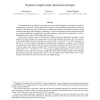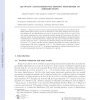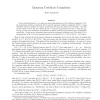249 search results - page 7 / 50 » One Complexity Theorist's View of Quantum Computing |
98
Voted
CORR
2010
Springer
14 years 11 months ago
2010
Springer
In this paper we present an equilibrium value based framework for solving SDPs via the multiplicative weight update method which is different from the one in Kale's thesis [K...
108
click to vote
STOC
2007
ACM
15 years 12 months ago
2007
ACM
The quantum adversary method is one of the most successful techniques for proving lower bounds on quantum query complexity. It gives optimal lower bounds for many problems, has ap...
104
Voted
STACS
2010
Springer
15 years 6 months ago
2010
Springer
Abstract. Suppose one has access to oracles generating samples from two unknown probability distributions p and q on some N-element set. How many samples does one need to test whet...
110
Voted
JCSS
2008
14 years 11 months ago
2008
Given a Boolean function f, we study two natural generalizations of the certificate complexity C (f): the randomized certificate complexity RC (f) and the quantum certificate comp...
STOC
1998
ACM
15 years 3 months ago
1998
ACM
Current formal models for quantum computation deal only with unitary gates operating on “pure quantum states”. In these models it is difficult or impossible to deal formally w...



